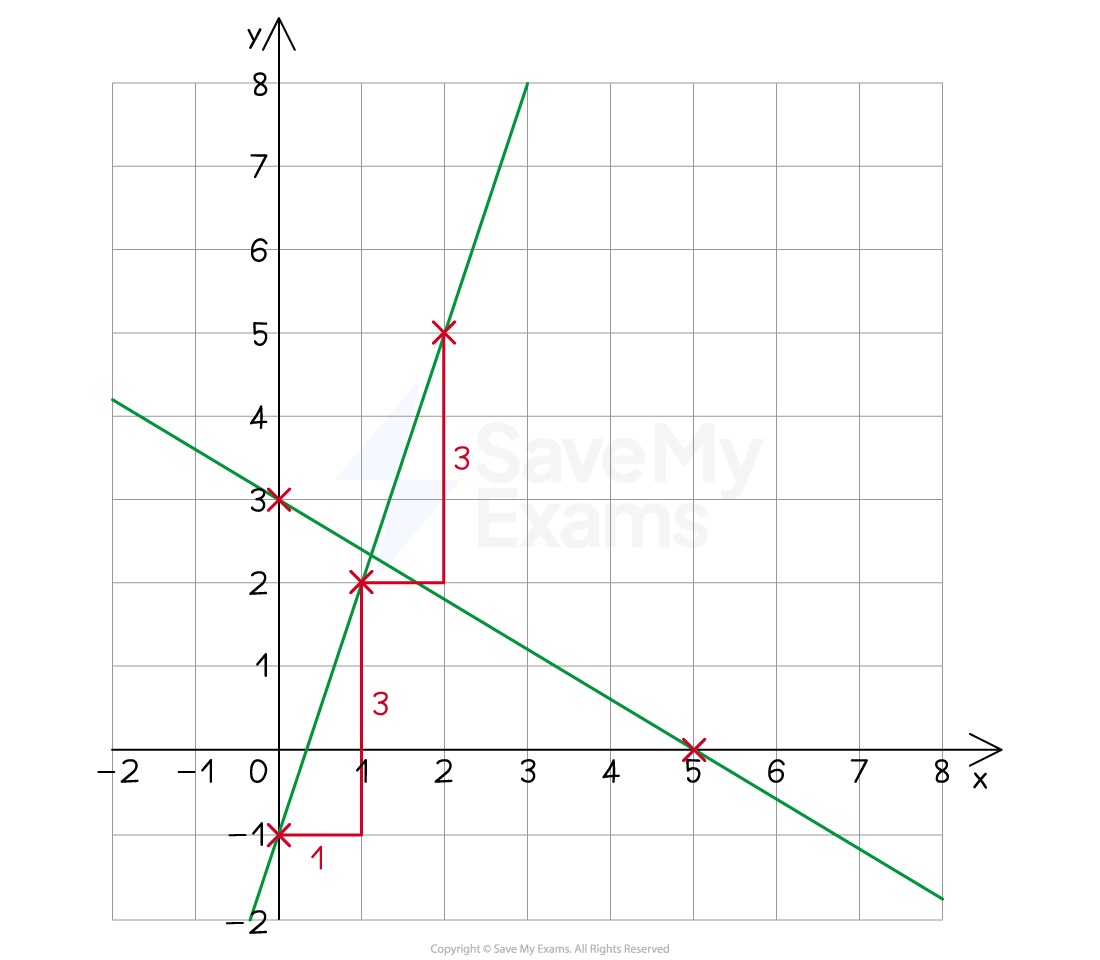Drawing Straight Line Graphs (Cambridge (CIE) IGCSE International Maths): Revision Note
Exam code: 0607
Did this video help you?
Drawing linear graphs
How do I draw a straight line from a table of values?
You may be given a table of values with no equation
Use the x and y values to form a point with coordinates (x, y)
Then plot these points
Use a ruler to draw a straight line through them
All points should lie on the line
For example
The points below are (-3, 0), (-2, 2), ... etc
-3 | -2 | -1 | 0 | 1 | 2 | 3 | |
0 | 2 | 4 | 6 | 8 | 10 | 12 |
How do I draw a straight line using y = mx + c?
Use the equation to create your own table of values
Choose points that are spread out across the axes given
For example, plot y = 2x + 1 on axes from x = 0 to x = 10
Substitute in x = 0, x = 5 and x = 10 to get y coordinates
Then plot those points
0 | 5 | 10 | |
1 | 11 | 21 |
How do I draw a straight line without using a table of values?
Assuming the equation is in the form y = mx + c
Start at the y-intercept, c
Then, for every 1 unit to the right, go up m units
m is the gradient
If m is negative, go down
If m is a fraction, remember that gradient is change in y divided by change in x
A gradient of
would be
units up for every
units right
This creates a sequence of points which you can then join up
Be careful of counting squares if axes have different scales
1 unit might not be 1 square
What if the equation is not in the form y = mx + c?
Equations will not always be presented in the form y = mx + c
Rearranging to y = mx + c will make plotting these graphs easier
Consider the equation
Subtract 3x from both sides
Divide both sides by 5
It can now be seen that the gradient is
and the y-intercept is 6
Make sure you only have 1 y on one side, rather than say, 5y
How can I plot equations in the form ax + by = c?
Instead of rearranging, equations in the form ax + by = c, like the example above, can also be plotted by considering the x and y intercepts instead
Substitute in x = 0 to find the y-intercept
Substitute in y = 0 to find the x-intercept
E.g. for
When
,
, so
When
,
, so
The points (0, 6) and (10, 0) can then be plotted and joined with a straight line
Examiner Tips and Tricks
Always plot at least 3 points (just in case one of your end points is wrong!)
Worked Example
On the same set of axes, draw the graphs of and
.
Answer:
Rearrange into the form
to make it easier to plot
For , create a table of values
0 | 1 | 2 | |
-1 | 2 | 5 |
Plot the points (0, -1), (1, 2) and (2, 5)
Connect with a straight line
Alternatively, start at the y-intercept (0, -1) and mark the next points 3 units up for every 1 unit to the right
For , create a table of values
Because of the fraction, x = 5 is a good point to include
0 | 3 | 5 | |
3 | 1.2 | 0 |
Plot the points (0, 3), (3, 1.2) and (5, 0)
Connect with a straight line
Alternatively, start at the y-intercept (0, 3) and mark the next points 3 units down for every 5 units to the right


Unlock more, it's free!
Did this page help you?